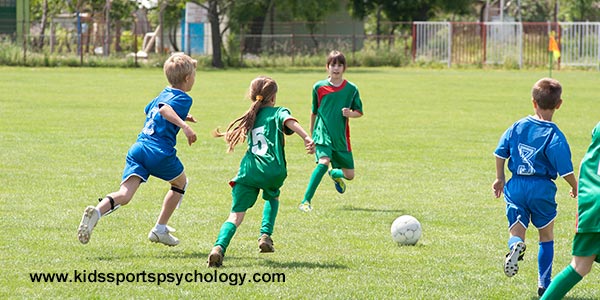
How to Encourage Without Pressure
All sports parents want their children to succeed and play up to their potential. It can be very frustrating when you think your kids are not performing up to their potential. As a sports parent, sometimes it is difficult to know how to encourage your kids to perform well. It’s hard to know when you may be applying too much pressure.
Many parents unknowingly pressure young athletes. For example, parents can over-emphasize the outcome of the game or being a leading scorer in a soccer game. What you think are positive comments can sometimes turn into expectations for your child. High expectations can translate into pressure: “I have to score three goals today so I don’t disappoint my parents.”
Parents can also be over-involved in their kids’ sports. It is important to support your kids and provide the opportunity to play, but being over-involved can pressure young athletes. For example, charting your child’s mistakes in a volleyball game or discussing your child’s mistakes with a coach after every game is too much. If kids know parents are charting their errors, they will focus on avoiding errors during a game, which will lead to tentative performances.
How can parents encourage their children without pressuring them?
You certainly want to focus on the process instead of the end result. For example, a young baseball player is struggling when at bat. Rather than discussing how many times he struck out, help your child focus on the process, such as picking up the ball quickly from the pitcher. If you focus more on improving the process, kids will feel like they have more control.
Helping your children improve their focus on process (or execution) is important, but it is just as important to praise them as well. Kids look to their parents for approval. Don’t focus on what results kids need to achieve. This may lead to anxiety. Kids can never get enough praise. That praise will in turn increase their self-confidence and willingness to try different things.
Don’t over-emphasize sports. You need to balance your child’s other activities–such as school or music–with sports. If your dinner conversations are always about sports, your kids may define their self-worth based on their performance in sports.
In order to help children reach their full potential as athletes, parents should stress mental toughness. When your kids’ opponents are at the same skill level, their mental game will ensure they’re better performers. Mental toughness helps athletes focus better, keep their composure and maintain their confidence. Overall, mental toughness helps athletes deal with stressful situations better.
Be sure your kids are playing for the right reasons. You want your kids to participate for the fun of the game rather than playing because they want to make you happy. Place your child’s needs first. Kids will feel pressured when they feel they must take part in sports in order to make a parent happy. If the kids’ hearts aren’t into playing, they will not likely want to improve.
Finally, encourage your kids to have fun rather than being too serious or work-oriented. When kids feel like it’s “work,” they are less likely to have fun. For example, most kids like to play games rather than constantly drilling. If your young athletes are basketball players, encourage games and play time, rather than doing drills to improve their techniques. It’s best to leave the coaching to the coach anyway.
Related Sports Psychology Articles
- Coping with Pressure in Youth Sports
- How Choking Hurts Athletes’ Performance
- Helping Sports Kids Avoid Burnout
*Subscribe to The Ultimate Sports Parent Podcast
*Subscribe to Peak Performance Sports on Youtube
Download a free sports psychology report to improve your mental game!
Sports Psychology Coaching for Young Athletes

One-on-one mental performance coaching is the fastest and most effective method to improve your athletes’ mental game, boost their performance, and make lasting changes. And as a bonus, parents learn what to say to help young athletes feel confident and thrive in sports. Please call us at 888-742-7225 with your questions.
